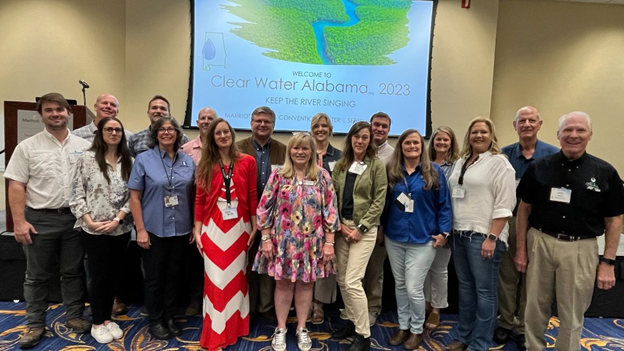AWW Director Mona Dominguez gave a presentation about the importance of citizen science to municipal stormwater management.

The Alabama Stormwater Association Symposium was hosted in partnership with the Alabama Soil and Water Conservation Committee.
On September 20, 2023, in Florence, AL, the Alabama Stormwater Association Symposium took place in conjunction with Clear Water Alabama. The Alabama Stormwater Association (ASA) is “an incubator and promoter of stormwater innovation, collaboration, communication, and connection for the good of Alabama and for the protection and restoration of the waters within and beyond its borders.”
ASA has a diversity of members, including stormwater professionals that work with cities, universities, state agencies, private consultants, and other organizations that work in various aspects of stormwater including policy development and enforcement, planning and design.
AWW was delighted to be invited to speak to the crowd of nearly 160 participants. AWW Director, Mona Dominguez, delivered the presentation “How Can Citizen Science Benefit Stormwater Management.” She defined “citizen science” and introduced the audience to Alabama Water Watch.

Through her talk, Mona explained how the AWW Program offers resources and support that can help stormwater professionals meet their five “minimum control measures,”
Municipalities with populations of 50,000 people or more are included in Stormwater Phase II regulation and as a result they must regularly apply for and maintain stormwater permits from the Alabama Department of Environmental Management. The permits must address how they will meet each of the minimum control measures:
Public Education and Outreach
Every Water Watch training includes content related to the water environment, water pollution, water quality standards and best management practices. Participants are able to learn and teach others in the community, including youth through the 4-H AWW Program.
The beauty of citizen science program like AWW is that every time a volunteer monitor goes out, the education process continues, and their curiosity grows as they build local knowledge.
Public Participation and Involvement
From monthly sampling and volunteer monitors becoming trainers to 4-H AWW educators… there are so many ways to engage the public. When stormwater managers engage with citizens through AWW, they can speak the same language. AWW volunteers feel heard, and the process of trust building and gaining support begins. Volunteers and stormwater managers have shared goals – we all want to protect water quality and address problems, but sometimes the process of problem solving is complex and takes time, so the more we can work together, the better!
Illicit Discharge Detection
Volunteer monitors can be a “first alert” detecting water quality issues throughout the areas in which they live. Volunteers are engaged in AWW because they want to keep their communities clean, and they keep their eyes out for potential illicit discharges. Beyond identifying issues, some volunteers go the extra mile and conduct investigative monitoring to pin-point the source of the problem.
Good Housekeeping
During trainings, volunteers not only learn about causes of pollution and how monitoring can detect water quality issues, but how those issues can be prevented by implementing best management practices.
Construction Site Runoff
Volunteers are no stranger to construction site runoff, and are often quick to snap a photo of a site that’s not quite up to code. Monitors also help detect construction site runoff by collecting turbidity data at their sites.
Mona also presented the concept of establishing AWW Hubs throughout the state where stormwater managers could host monitoring materials, assist with recruitment and training of volunteer monitors, help monitors with site selection, and generally extending outreach and education throughout their communities using AWW’s model and resources.
Key Take-Aways
Partnering with AWW is an effective and economical way for stormwater managers to meet their Minimum Control Measures. AWW Volunteers can be a first alert for local water issues and educate others about stormwater best practices. Volunteers also offer critical community support for shared water-quality goals, and bring their personal experience and expertise to the table.
AWW is appreciative of the opportunities we have had to engage with municipalities and counties as they manage stormwater including Jefferson County and the cities of Auburn, Opelika, Phenix City, Foley, Daphne, and Fairhope. We feel that there are still many ways we can expand this application of AWW and hope that more entities were motivated to partner with us following the ASA Symposium.
